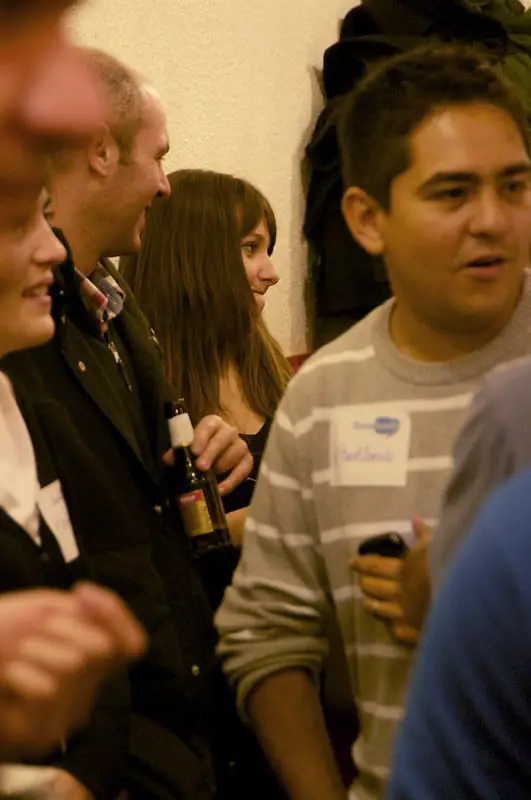How to Network in the Music Industry: Building Bridges
To learn how to network in the music industry, you must be prepared to put in the hard work. After all, success doesn’t just happen overnight.
When learning how to network in the music industry, you must research the right contacts, be prepared to talk and listen, and know how to sell your brand or act.
Networking opens up dozens of new pathways if done correctly. It can also burn bridges if you take the wrong approach or alienate a new contact. Many
Therefore, knowing the right tactics and strategies is vital to expanding your Rolodex as your career develops. So what are the rights ways to network in the music industry?
Why bother networking?
Networking is a great way to build your music career. Regardless of your music genre, instrument, or talent, you can’t do it alone. Networking is building that group of fellow industry professionals you can count on.
Reaching out can expand your portfolio and brand in multiple ways. It’s not just record execs that you want to look out for, as there are many people you can link up with. This includes:
- Promoters & bookers
- Established artists
- Management staff
- Commercial partners
- Technical experts
- Media representatives
All these different types of personnel have expertise in the music business with valuable insights and knowledge to pass down.
Also, forming a network allows your band to expand and grow in ways not previously thought of. This could be lucrative media opportunities, trying out new gear, or playing with your idols.
Therefore, networking opportunities will help you grow and should always be taken if you have the chance. But before you can do that, you might have negative feelings about the whole thing. Below, you’ll find some tips you can use to overcome networking.
How to overcome your natural dislike of networking
Networking has a bit of an impersonal reputation. This is because many musicians see it as using others. To overcome this issue, focus on how you can give to these musicians. The more you help, the more that help will be returned. This is networking at its core.
There’s another problem people have with networking. It just feels unnatural, especially if you are uncomfortable with social situations.
How many people actively consider networking natural? It’s less than you would think as people enter into the industry.
This might be because some people are too cautious about reaching out to more experienced campaigners, and some imagine they will be discovered automatically.
The most successful acts have achieved their fame through hard work. That included putting themselves out there and establishing relationships with industry veterans.
For everyone else, social anxiety is normal. You aren’t a weirdo in a group of proven music industry professionals. You are a music nerd surrounded by other music news with just as much passion as you. Many of those nerds have similar feelings of social anxiety.
What to do before you start networking (first steps)
Taking those first steps is never easy but doing your leg work to build stronger connections is vital to finding the correct links for your act.
It isn’t something that will happen overnight, though. It may take some time to break through and start to get noticed. However, you can take some steps to increase your chances of getting noticed. So how do you do this?
Do your research about eventgoers and events
Before even contacting anyone, you need to research who they are and how they might be able to help you (and how you can help them).
This will help steer the conversation to more meaningful areas and show you’re serious about potential business opportunities.
Thankfully, it’s easier than ever to learn about what people do and their expertise. A quick flick onto platforms like LinkedIn or Instagram gives you an overview of their network base and what they have done in the industry.
Take your time to scroll through these pages and see if these aspects resonate with you. This might be through sharing an acquaintance or being based in your local area.
Don’t just limit this to off-stage personnel, though. Take a similar approach to bands or acts that are at a similar stage to you.
Browse through Spotify, listen to their music, and see where they perform. Looking at what other acts are doing shows who you could perform with and the venues or promoters you could connect with.
Doing this research gives you the perfect set-up to start pushing forward and reaching out to other music professionals.
You’ll also want to do similar research to find out about potential networking events. You can leverage your existing connections to find out more. However, you can also use sites like Eventbrite for larger-scale gatherings.
Use social media to engage with potential contacts
Everything in the modern day goes through social media, and this should be your first progression in networking. Once you find a good event, social media is a great way to engage with it (and others going to it).
Social media is the best gateway to branch out and build your network. This works in indirect and direct ways to initiate a relationship, regardless of whether or not there’s a networking event. Here are some ways you can grow your network on social media:
- Follow their pages. Following a page on Instagram or Twitter shows an interest in someone’s work and keeping informed on any updates in their lives. You can also offer to follow people on social media at the party, which tells your followers they are worth your time.
- Build digital links. Linking up on social media gives a casual indirect bridge between you and someone else. People who see you following their profile may head over to your page and know who you are and what you are about
- Post about the event. Share with your current followers that you’ll be at the event. This will let you connect with contacts you’ve already engaged with. It helps to reduce social anxiety a bit if you know someone at the party.
- Reach out about the event. If you see interesting music business contacts, contact them regarding the event. Use hashtags to let them know what you are talking about and express interest in talking with them.
- Consider online conferences. Because of COVID-19, many conferences have moved to online venues. Use social media pages on Facebook or Instagram to keep music industry events in mind.
By having an active social media presence, you have already potentially overcome the scary thought of breaking the ice with someone. And breaking that wall down before an actual conversation can only be a good thing.
Practice and plan before you jump into the networking event
Now that you’ve thought about everyone else, it’s time to look inward. When it comes to networking, this means knowing what you will do and say in different social situations.
Conversation is a two-way street, and if you can’t bring yourself to the conversation, you won’t make authentic connections. You’ll want people who can appreciate the “true you,” but this might not come naturally.
You need to know what you are all about. You must strike a balance between what is and isn’t the right thing to promote. So before chatting with anyone, you should:
- Say who you are in one sentence. People will switch off if you can’t describe yourself in just a few words. So before you begin, practice a 30-second blurb on what you are and who you do. This is your elevator pitch, and you can use it with all music industry members.
- Listen. One of the most in-demand skills in the world is listening, and few people are good at it. But listening is a skill you can practice with your friends, so take the time to do it where you can. Don’t be afraid to ask someone to repeat themselves as well; it shows you care about their words.
- Set loose goals. Goals are a great way to create your requirements for a networking event. If you want to meet new people, set a goal to engage with a minimum of five different groups. By doing this, you’re more likely to pursue those desired connections.
- Use business cards. The “Rolodex” we mention used to be a container for business cards, which is still in use. Despite what this generation might tell you, having cards makes it easy to give information people can use to follow up with you.
When defining and learning who you are, take your time. If you know who you are, then it makes selling yourself to a stranger that much easier.
Your perception
When it comes to your presence at an event, how you present yourself away from direct conversation is just as important.
It only takes one quick look at someone to see if they are worth conversing with or if you will turn away and chat with someone else.
Therefore, think about how you are being perceived in the room and hope that you are giving off a vibe that shows you are wanting to be there. What this means is:
- Look tidy and professional. You don’t have to be dressed in a suit and tie at every meeting but make sure you keep with the dress code. If an event states a dress code, adhere to it best. The right look goes a long way and will ensure people take you seriously at an event.
- Don’t hide in the corner. The more you put yourself out there, the more positive vibe you give off. It makes you seem approachable and want to build your brand. If you sit in the corner and scroll on your phone, you will be ignored and miss many potential opportunities.
- Know your limits. There’s nothing worse than being at a professional gathering and grabbing the headlines for the wrong reasons. This means you should always be respectful even if things don’t go your way and avoid having too many drinks, which could make you look like a fool.
- Focus on genuine connections. If you are reading this, the event probably doesn’t have your name on it. So, don’t treat it as a way to self-promote. Instead, focus on making genuine connections. These people (who you can eventually trust) will be support networks you can use and contribute to in your musical career.
If you can sell yourself as a positive and serious individual without saying a word, then you have always got all eyes drawn on you. This makes having conversations easier and expanding your network more likely before you even utter a phrase.
What to keep in mind while you are networking
When it comes to networking in person, how you carry yourself on the day will be key to what you get back from an event. This goes for any aspect of your behavior, such as your physical interactions, mental approach, and looks.
All of this might seem like a scary proposition, but a bit of nerves is to be expected, and you won’t be the only one feeling like this. So how can you translate this when at an event?
Interacting with people
A big part of networking is meeting new names and interacting with different people for the first time. It can be daunting, but if you make the right impression, it will open a host of new barriers.
Thankfully, there are plenty of ways to have engaging conversations, no matter who you might be chatting with. As you do this, make sure you:
- Engage in two-way conversations. The best way of building a meaningful conversation is by keeping things going back and forth. Be prepared to listen attentively and not be scared to give thoughts on a matter. By doing these, it builds an understanding between you and those you’re chatting with. It also means you need to let the other person talk, so don’t interrupt.
- Draw on personal experiences. Never be afraid to share a personal anecdote with someone. If you can naturally relate to a point, it shows your true character and gives insights into who you are as a person and a professional. Just keep it appropriate, though.
- Be ready to share information. If you have had a productive conversation and someone wants to know more about you, be ready to share that information. If you can redirect them to social media and share a business card with someone, it gives a lasting connection that can be drawn upon in the future.
- Pay attention to your body language. Your body language says a lot about how comfortable you are during the conversation. Keep your arms relaxed and at your sides, and avoid crossing them when possible. With social gatherings, it’s best to maintain a relaxed posture.
- Be upfront with your intentions. If you try to hide your goals, this will come through in how you talk. Most people do not have the social skills to be master manipulators (and even those people eventually get found out). Be honest and upfront with your intentions and goals, as that will help you find the right connections faster.
All these actions will leave a lasting impression if you’ve conducted yourself meaningfully, so always think about these things when having a chat with someone
What you need to keep in mind when not interacting with people
When you are between conversations, you might veer off the path a bit. Affirm your goals to yourself if you want to keep at it.
If you feel overwhelmed, don’t be afraid to take a break. For some extra tips to keep in mind when not interacting, read these tips:
- Avoid drinking. These parties almost always have some form of booze. Despite how much you have, it isn’t good to drink when you have specific goals. Those goals often get lost when you have too much to drink.
- Walk between different groups. Music industry events often collect into different groups. To find the group where you belong, walk between them. Find groups that are open and welcome you to participate.
- Don’t sit. While being tired is normal, sitting isn’t something you want to do at these events. It tells people you don’t want to be bothered or lack confidence. But, if you need to take a minute to yourself, finding a spot to sit might not be bad, don’t expect people to approach you.
- Don’t intrude on all conversations. If you see two people conversing, this is probably not for you. Instead, focus on joining groups of people who are inviting all comers. This is why sitting is bad, as you can’t make a quick escape.
- Don’t use your phone. Using your smartphone tells people you don’t want to talk. So whenever possible, put it away when you are looking for a conversation.
Don’t rest on your laurels
As you become more knowledgeable on how to network in the music industry, it means you should become more proactive in how you build your network.
This is where you actively start following up on your networking links and potentially start new business relationships. To do this, you ought to know a few simple steps, such as:
Be accepting of rejection. Not every conversation will go your way. If you send something across to a rep and they aren’t interested – that’s ok. Reps get dozens of pitches every week and won’t accept everything they are sent. Just graciously accept this for now and keep the door open in case they show interest in the future
As you slowly build and progress your contact list, you will slowly see more opportunities that present themselves in the future. As long as you stay proactive, it increases your chances of securing more deals and raising your profile.
What to do after you are done networking (the follow up)
When you first get home from a music networking event, the first thing you’ll want to do (probably) is kick up your feet and relax. Take the time to relax, as you’ll need to act on what you did during the event.
You might’ve met some potential friends, gained new connections, and stuffed your pocket full of business cards. In any case, here are some tips to keep in mind when following up with your new potential connections:
- Sending out promotional information. If someone took your business card or is interested in your act, send out more information to these parties. This includes sending over an electronic press kit, messaging about potential ideas you discussed, and keeping the conversation going. It’s these actions that convert chat into contracts.
- Follow up on actions. If you promised to do something after a conversation, do just that. Leaving someone hanging or not delivering looks unprofessional and turns people away. Therefore, make sure you reach out and do what you promised, no matter how small this act might be.
- Browse your business cards. Many music professionals might give you their cards out of interest. You don’t have to respond to all of them, just those you feel would contribute the best towards your goals. Throw out the ones that didn’t express any interest in you, as they might just be looking to self-promote.
- Schedule meet-ups. Even if you didn’t promise anything specific, you might ask people to meet up with you. Much like during the party, make it clear what your intention of the meet-up is. If it doesn’t mutually benefit both parties, the other party might not want to meet with you.
How to network in the music industry: what you should avoid
As always, there are certain things you mustn’t do when trying to build your network in the music business. It can only take one moment to turn off potential suitors for good.
And it is much trickier rebuilding a burned bridge than establishing one from scratch. If you do this too often, you could even end up with a stigma of being one to avoid. What brings this on? Well, you should never:
- Don’t be slanderous. Gossiping can have a nasty habit of biting you back, so avoid it. Badmouthing other acts or brands can alienate those who have direct relationships with them and cost you deals directly. Don’t give in to the gossip and focus on more positive avenues of conversation
- Leave things outdated. You will be left behind if you don’t update people on your progress. Having outdated social media profiles or EPKs show that you aren’t serious about your band and give the wrong impression to new contacts. That’s the last thing you want to do in this fast-changing industry
- Act pushy or arrogant. There’s a fine line between selling yourself and acting arrogant. Overselling yourself or pushing that one big achievement too many times makes you seem rude and desperate. Be open to interpretation, and remember there are two people in a conversation.
These things may seem simple enough to follow, but it can all be too easy to get caught in the moment. Think carefully and avoid these tropes to ensure you remain on the right track.
Do you think you know how to network in the music industry?
As you can see, there’s much to think about when learning how to network in the music industry. It is an essential part of building your band but is also something that won’t just happen overnight.
Knowing who you are as an act or brand is a big part of the networking process. After all, learning this will help you sell yourself quickly to company reps and establish talking points in a hurry.
Once you can sell yourself, you can slowly think about how to sell yourself to others. This includes knowing who to talk to, how to approach them, and having meaningful conversations when the time comes.
It’s also wise to be wary of how not to conduct yourself when building your Rolodex. Alienating and making strangers uncomfortable only hurts your image and limits how you network in the music industry.
Once you do know how to establish new relations, though, you will be able to help take your links further and potentially convert them into lucrative deals if everything aligns correctly.
By having a wider contact list, your act will only grow over time, showcasing just how important it is in the current age to know how to network in the music industry.







